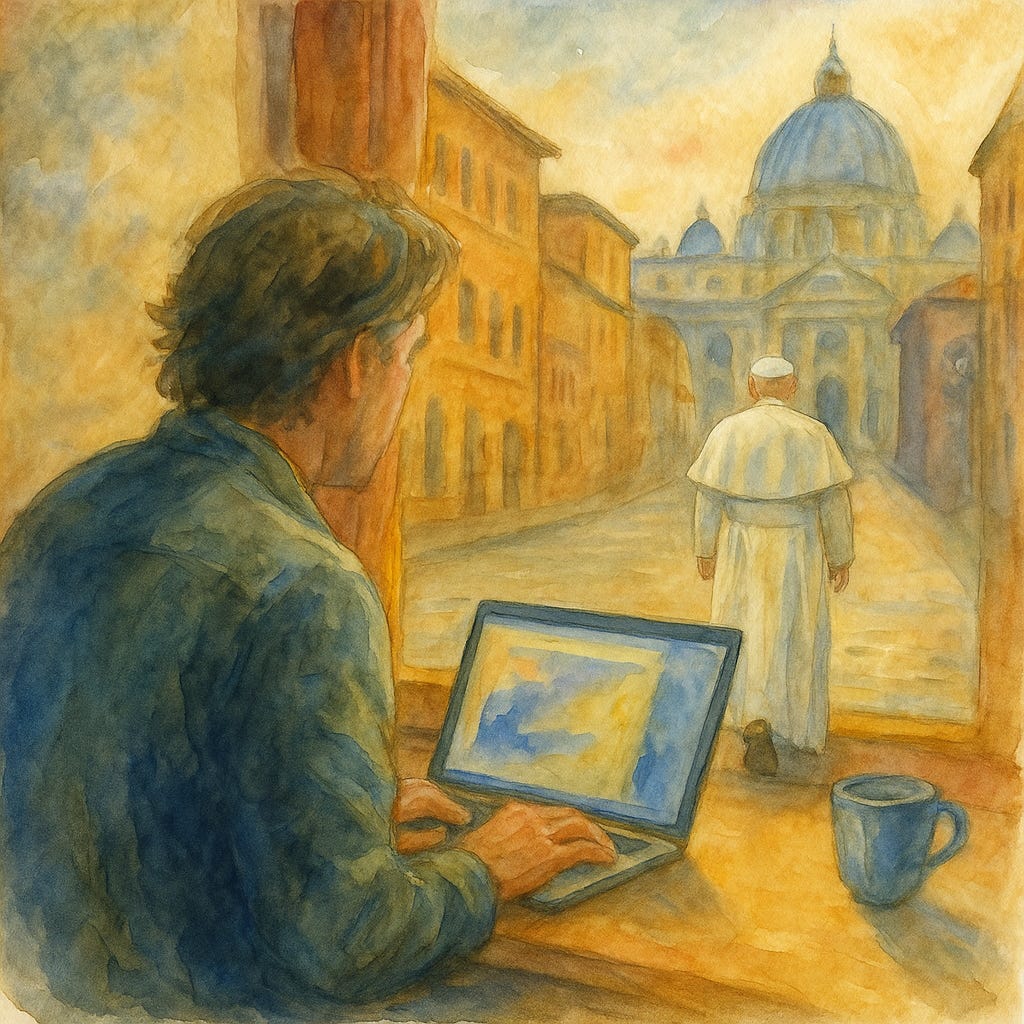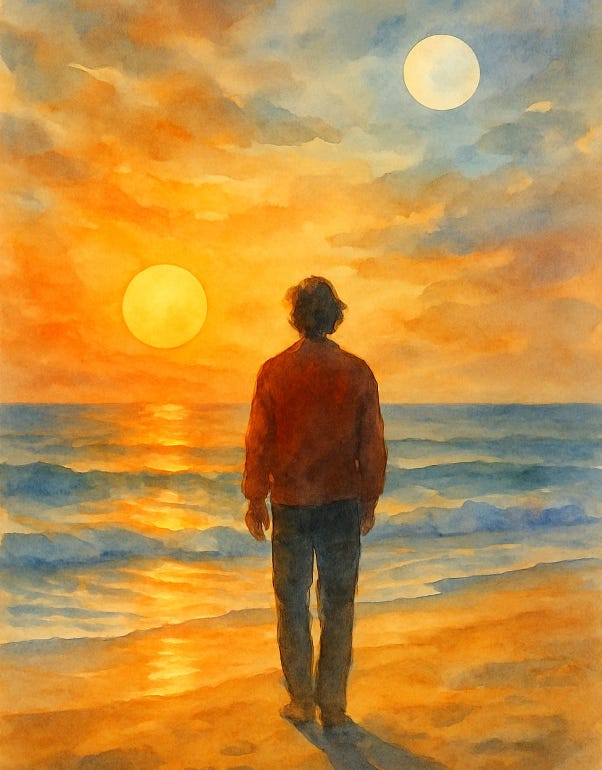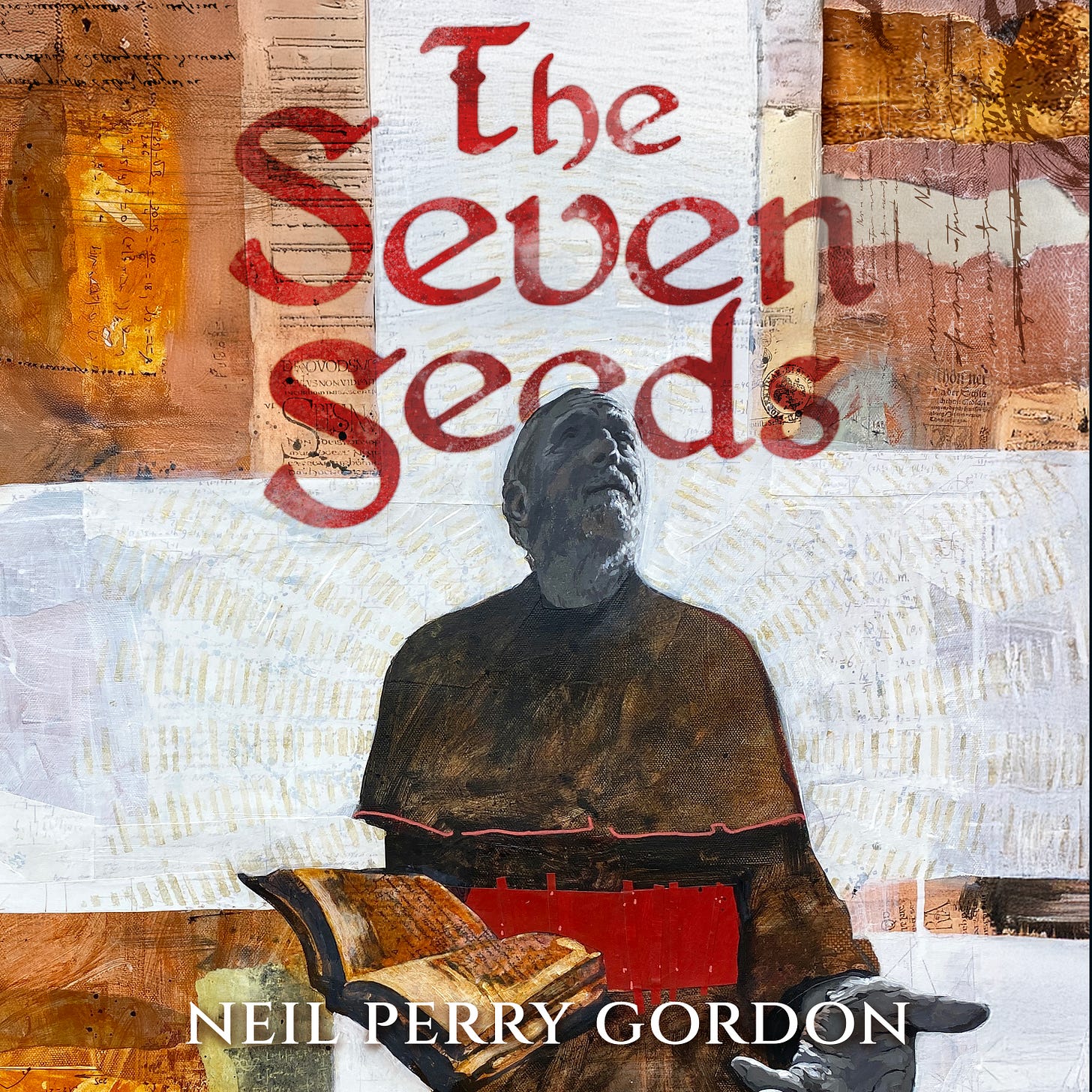The news of the Pope’s passing struck me not only as a global moment of mourning, but also as something strangely personal. Not because I’m Catholic. I’m Jewish—culturally, ancestrally, spiritually. And yet, as I sat with the stillness that followed the headlines, I realized just how much time I’ve spent with Christ these past months—not in prayer, but in prose.
My novel, The Seven Seeds, began as a metaphysical reimagining of history, a “what if” whispered through the corridors of Rome: What if Christ had never walked the Earth? What if Rome never fell? But it evolved into something far more intimate. It became a journey of uncovering what Christ-the soul, the archetype, the spiritual presence—actually means in the context of human destiny.
Writing it as a Jew was an unexpected act of reconciliation.
Not with a church or doctrine, but with the deep, universal idea of the Logos—the Word made flesh. The bridge between the divine and the human. The seed planted in darkness that seeks the light.
I didn’t write The Seven Seeds to make a theological point. I wrote it to ask a human question: What is lost when we forget the sacred roots of virtue? Compassion, humility, justice, forgiveness, courage, wisdom, sacrifice—these are not the property of any one tradition. They are universal truths, carried across time in story, symbol, and soul. What matters is not the religion, but the remembrance—the path walked by those who choose love over power, and meaning over control.
And though I grew up with a different language for God, I recognize that path. I’ve walked echoes of it in Hebrew blessings, in desert parables, in quiet moments where something greater pressed close. I’ve also felt it in traditions not my own—in chants, in incense, in crosses carried, in prayers whispered in languages I’ve never spoken.
So perhaps it’s no surprise that as I wrote The Seven Seeds, I found myself not resisting Christ, but listening. Not converting, but remembering.
Because if reincarnation is true—and I believe it is—then I have not always worn the garments of Judaism. Perhaps once I was a monk. A mystic. A nun sweeping candlelight through stone corridors. Perhaps I, too, once gazed at a crucifix not with confusion, but with longing.
We are older than our bloodlines.
The Pope’s death reminded me that no matter how fractured the institution becomes, the mystery still pulses beneath. The soul of the world is not owned by any religion. It is carried by those who tend to the light.
The Seven Seeds was my way of tending. Of asking,
“What happens when the soul of virtue is lost to empire? What does it take to remember?”
And so as the white smoke clears and a new figure steps into the robes of Peter, I return to my work—seeding stories not as dogma, but as remembrance.
Because I believe the sacred still walks—perhaps not in a single form, but in the courage of every soul who dares to love in a world that exalts conquest.
And if we are brave enough to listen, we may find that the seeds of light and remembrance are still waiting to grow within us all.
Even me.
Even now.
There are moments in life when the boundary between the ordinary and the eternal seems to thin—when the world itself invites you to listen. This poem was born from such a moment: walking along a quiet Florida beach at sunrise, I found myself standing between two great celestial witnesses—the red flare of the rising sun and the pale retreat of the waning moon.
In that liminal breath between night and day, with the warm sand beneath my feet and the timeless hush of the sea around me, something stirred. Not new, but remembered. A glimpse of the soul's deeper rhythm—beyond noise, beyond striving, cradled between two tides.
This poem is an offering from that hour. A vow, whispered not just to the world, but to myself, to stay awake to the fierce, fleeting beauty that is ours for only a breath.
On the breath of dawn I stand—
between the red rising sun
and the silver retreating moon,
where shadows stretch thin
and time forgets its weight.
The sand is warm beneath me,
a hush of ancient fire cooled by night,
and the sea whispers—not in words,
but in rhythms older than thought,
lapping gently at the hush of now.
Here, I feel the essence of my soul—
not as something possessed,
but as something remembered.
My place upon the earth
is neither beginning nor end,
but a moment cradled
between tide and tide.
And though the world may rush and rage,
here I vow to remain awake—
to not forget
the soft, fierce beauty
that is mine
only for this fleeting breath.
~NPG~
What if Rome never fell? What if Christ never walked the Earth?
Step into a world reimagined in The Seven Seeds: Shepherd of Souls, where history takes a daring turn, and the stakes are nothing less than the soul of civilization itself. Torn from the sanctity of the Vatican, Pope Gregory finds himself thrust into an alternate reality—a Rome that never fell, untouched by Christianity, where mythical gods of conquest and power reign supreme.
Lost in a world ruled by ambition and relentless power, Gregory uncovers an ancient manuscript revealing seven transformative virtues: compassion, humility, forgiveness, justice, wisdom, courage, and sacrifice—The Seven Seeds. These timeless ideals are key to challenging an empire’s unyielding brutality and forging a bridge between two worlds divided by conflict and despair.
As Gregory struggles to plant the seeds of change, he must navigate the grandeur and cruelty of a timeless Rome. With the help of unlikely allies, he begins a mission to spread these virtues, risking everything to defy a merciless Emperor and inspire hope in the hearts of the oppressed. Each step brings unimaginable trials, testing Gregory’s faith and forcing him to confront the beliefs that have defined him.
The Seven Seeds is an epic tale of transformation and redemption. History collides with what could have been, and humanity teeters on the edge of profound change. For readers who yearn for sweeping narratives, richly imagined settings, and stories that challenge the very nature of human destiny, this novel offers a journey that will grip their imagination and stir their souls.
Author Neil Perry Gordon presents a compelling alternate history that seamlessly blends historical elements with a touch of fantasy. The concept of a Rome without Christianity makes an intriguing setting. For the first time, I actually enjoyed the political tension in a story. The author handled cultural differences with care and deliberation, making sure readers were invested in Gregory’s progress. Gregory is a compelling protagonist. He is a man of deep conviction who is thrown into a world that challenges everything he knows.”
The introduction of the Seven Seeds as a catalyst for change is the core of the plot, and the author does a wonderful job of explaining it. I loved how the pace and the overall feel of the story were cohesive and complete. Nothing was out of place, everything was planned with care, and written with confidence.
To say that I loved The Seven Seeds would be an understatement. Highly recommended! A real 5-star novel.












Dear Larry,
Thank you so much for sending me Steiner’s Judaism: Christ’s Placenta lecture. I just finished reading it, and I’m struck by how beautifully it complements the themes I was wrestling with—especially the idea that deep spiritual movements in history are not about negation or replacement, but about unfolding, evolution, and remembrance.
Steiner’s image of Judaism as the nourishing placenta for the Christ event profoundly resonated with me. It mirrors what I was intuitively reaching for in The Seven Seeds and my essay: that nothing essential is ever lost, only transformed when its time is fulfilled. The idea that the sacred threads of different traditions are not severed but woven into a larger tapestry gives me great solace, especially as I reflect on my journey as a Jew writing about Christ and the universal mystery.
I’m grateful not only for the text itself but for the gesture behind your sharing it. These kinds of conversations—soulful, searching, bridging worlds—are precisely what I hope to foster through my writing.
With gratitude and warm regards,
Neil
https://martyrion.blogspot.com/2025/04/judaism-christs-placenta.html